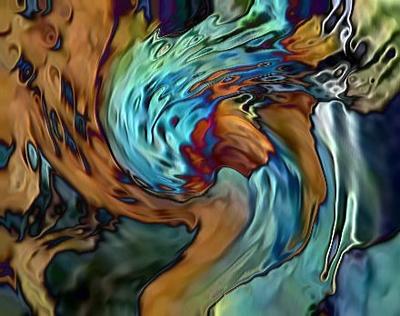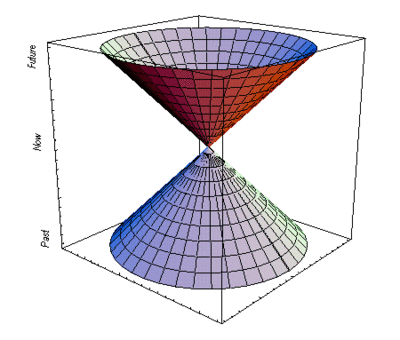(Part 3) At c:
When we consider perception do we indicate perception itself or that aspect of our natural perceptual apparatus we have chosen to use? Is the world we witness by means of that apparatus the world itself, or its representation according to consensus? The trauma of culture shock, more dramatic depending on the cultural differences, is testimony to the ephemeral nature of perception as we ordinarily use it.
Is there another way? Is it possible to perceive the world without the imposition of one’s cultural biases, or even biases based on personal experience? We place great trust in personal experience because it is based upon actual occurrence, whereas the experiences of the culture, no matter how small or large, are always secondhand. Yet, both mediums are limited by the extent to which they are exposed to the world. No individual or culture can experience the entire world in its manifold manifestations in all places and times. So perception is always conditional.
Still, the question persists, is there something in the world, in nature, in reality that is fundamental to the world generally? Physics offers an answer by way of the molecular, atomic, and sub-atomic, but these remain suspect because of the variety of phenomena for which it cannot account. Further, quantum physics and string theory suggests (some might say insists) that the behavior of the physical world depends on what we ask of it. We perceive what we assume, or at least within the parameters of our assumptions, even if our assumptions are based on the most precise measurements possible. Measurement itself is based upon a series of assumptions.
In all of this we have made a choice. We have chosen thought and conceptualization over direct sensual stimulus. For all the glorification and over-stimulation of the senses, when we want to know about the world we rely upon what the intellect does with sensory stimulation and the conclusions it draws based on that intellectual process. Yet, we know that the world is not fabricated from our intellect or even our senses, or do we? Proclaim as we might that reality is subjective; the only proof we have to offer is subjectivity itself. It is a closed box. Is this our limit? Is the subjectification of perception an impenetrable absolute? Is it, like the speed of light, the boundary beyond which we can never hope to pass? Perhaps most scientists and philosophers would say yes. Never mind what the religions say. Myth or metaphor may provide an answer, but not as long as it is locked inside the confines of the organized religions – which is nothing more than collective neurosis, at worst even psychosis, or at best cults of particular forms of subjectivity.
Was there ever a time before time became locked into these assumptions when the senses were allowed to do their work without the immediate imposition of intellect? Would that be a condition that is not human? Isn’t this precisely the category into which we place all animals other than ourselves? While granting them some degree of reason, we generally regard the other animals as creatures controlled primarily by their senses. This conclusion is of course based upon our measurements and observations: again we are locked inside the box of our assumptions. And we add assumptions on top of assumptions when we behave as if the mind, the intellect, is not itself a natural phenomenon.
Are all species similarly closed from one another and closed into their own domain? Is our species, due to the degree of its contemporary dominance, merely arrogant? We will not know until we have unlocked our assumptions and allowed our perceptual capabilities the freedom to experience without the imposition of those assumptions. That is to say, perception is direct, primary, and fundamental. It is im-mediate – not mediated until we learn to make a choice. We learn to choose conceptualization over an im-mediate response. Why? Is it because we fear what our “animal instincts” might do without the imposition of that careful minder or the senses? Would it lead to mass murder and the destruction of civilization? Has civilization put an end to murder or other brutal behaviors? Quite the contrary. It seems that in the heart of civilization we find voluminous evidence of brutality beyond anything outside its domain. It appears that the assumptions and concepts upon which civilization is based may generate a greater level of brutality and self-destruction than any other animals, human or otherwise, are capable of without it. Civilization, at its very root, may be completely contrary to the very behavior it proposes to neutralize. Could this have something to do with perception, or the machinery to which we subject perception? Haven’t we, in the organizational structures of civilization turned nature against itself – or more specifically, turned ourselves against ourselves – from the inside out? Each of us, day to day, struggling against ourselves for the purpose of controlling that which lies utterly beyond our control: nature, both inside and outside our domain. Is there any way to resolve this profound dilemma? Our sensual perception and our mind (and there is ultimately no distinction between them) and the nature from which they spontaneously arise may offer that resolution.
We are still at prologue, but we are in motion now, and moving toward that open space beyond the expression At c:.
Jake Berry 11.20.05
Is there another way? Is it possible to perceive the world without the imposition of one’s cultural biases, or even biases based on personal experience? We place great trust in personal experience because it is based upon actual occurrence, whereas the experiences of the culture, no matter how small or large, are always secondhand. Yet, both mediums are limited by the extent to which they are exposed to the world. No individual or culture can experience the entire world in its manifold manifestations in all places and times. So perception is always conditional.
Still, the question persists, is there something in the world, in nature, in reality that is fundamental to the world generally? Physics offers an answer by way of the molecular, atomic, and sub-atomic, but these remain suspect because of the variety of phenomena for which it cannot account. Further, quantum physics and string theory suggests (some might say insists) that the behavior of the physical world depends on what we ask of it. We perceive what we assume, or at least within the parameters of our assumptions, even if our assumptions are based on the most precise measurements possible. Measurement itself is based upon a series of assumptions.
In all of this we have made a choice. We have chosen thought and conceptualization over direct sensual stimulus. For all the glorification and over-stimulation of the senses, when we want to know about the world we rely upon what the intellect does with sensory stimulation and the conclusions it draws based on that intellectual process. Yet, we know that the world is not fabricated from our intellect or even our senses, or do we? Proclaim as we might that reality is subjective; the only proof we have to offer is subjectivity itself. It is a closed box. Is this our limit? Is the subjectification of perception an impenetrable absolute? Is it, like the speed of light, the boundary beyond which we can never hope to pass? Perhaps most scientists and philosophers would say yes. Never mind what the religions say. Myth or metaphor may provide an answer, but not as long as it is locked inside the confines of the organized religions – which is nothing more than collective neurosis, at worst even psychosis, or at best cults of particular forms of subjectivity.
Was there ever a time before time became locked into these assumptions when the senses were allowed to do their work without the immediate imposition of intellect? Would that be a condition that is not human? Isn’t this precisely the category into which we place all animals other than ourselves? While granting them some degree of reason, we generally regard the other animals as creatures controlled primarily by their senses. This conclusion is of course based upon our measurements and observations: again we are locked inside the box of our assumptions. And we add assumptions on top of assumptions when we behave as if the mind, the intellect, is not itself a natural phenomenon.
Are all species similarly closed from one another and closed into their own domain? Is our species, due to the degree of its contemporary dominance, merely arrogant? We will not know until we have unlocked our assumptions and allowed our perceptual capabilities the freedom to experience without the imposition of those assumptions. That is to say, perception is direct, primary, and fundamental. It is im-mediate – not mediated until we learn to make a choice. We learn to choose conceptualization over an im-mediate response. Why? Is it because we fear what our “animal instincts” might do without the imposition of that careful minder or the senses? Would it lead to mass murder and the destruction of civilization? Has civilization put an end to murder or other brutal behaviors? Quite the contrary. It seems that in the heart of civilization we find voluminous evidence of brutality beyond anything outside its domain. It appears that the assumptions and concepts upon which civilization is based may generate a greater level of brutality and self-destruction than any other animals, human or otherwise, are capable of without it. Civilization, at its very root, may be completely contrary to the very behavior it proposes to neutralize. Could this have something to do with perception, or the machinery to which we subject perception? Haven’t we, in the organizational structures of civilization turned nature against itself – or more specifically, turned ourselves against ourselves – from the inside out? Each of us, day to day, struggling against ourselves for the purpose of controlling that which lies utterly beyond our control: nature, both inside and outside our domain. Is there any way to resolve this profound dilemma? Our sensual perception and our mind (and there is ultimately no distinction between them) and the nature from which they spontaneously arise may offer that resolution.
We are still at prologue, but we are in motion now, and moving toward that open space beyond the expression At c:.
Jake Berry 11.20.05


